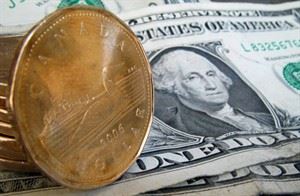
Canadian dollar, commodities tumble in wake of disappointing Chinese growth data
TORONTO – The Canadian dollar tumbled about three-quarters of a US cent Monday morning amid a massive sell-off in gold and data showing the Chinese economy growing slower than expected.
The commodity-sensitive loonie dropped 0.7 of a cent to 97.96 cents US as prices for oil and copper also fell sharply.
The trigger for Monday’s selling pressure for energy and base metals came from data showing that the world’s second-largest economy grew by 7.7 per cent compared with a year earlier in the most recent quarter, down from the previous quarter’s 7.9 per cent. That fell short of many private sector forecasts that growth would accelerate slightly to eight per cent.
Gold prices deepened a sell-off that gained ground last week, as the June contract on the New York Mercantile Exchange plunged $97.50 to US$1,403.90 an ounce following a $63 drop on Friday.
Several reasons have been cited for the drop in gold prices.
Goldman Sachs, last week lowered its average gold-price forecast for 2013 to US$1,545 an ounce, a level it took out last Friday.
Doubts about the future of the U.S. Federal Reserve’s monetary policy program known as quantitative easing have also factored in. The program involves printing money to buy US$85 billion of bonds every month. It has had a depressive effect on the U.S. dollar in the past and helped hike gold prices since bullion is seen as an inflation hedge.
But analysts point out that if QE is ended later this year, the need for an inflation hedge is reduced.
There has also been speculation that Cyprus may sell a chunk of its reserves to finance its part of its financial rescue. Though that may not materialize, it was enough to prompt some investors to think that a gold-selling strategy may be used elsewhere in the troubled eurozone.
The Chinese data helped push the May crude contract on the New York Mercantile Exchange down $1.71 to US$89.58 a barrel while May copper dropped 12 cents to US$3.23 a pound.
China has been the world’s biggest consumer of copper, which is viewed as an economic bellwether as it is used in so many applications.
The poor performance of the dollar came two days before the Bank of Canada makes its next announcement on interest rates. The bank likely won’t be raising rates any time soon, with most economists expecting the bank not to make a move until at least the third quarter of 2014.
Traders will look to the central bank’s accompanying statement to see if it is revising its economic forecast.
Join the Conversation!
Want to share your thoughts, add context, or connect with others in your community? Create a free account to comment on stories, ask questions, and join meaningful discussions on our new site.














Leave a Reply
You must be logged in to post a comment.